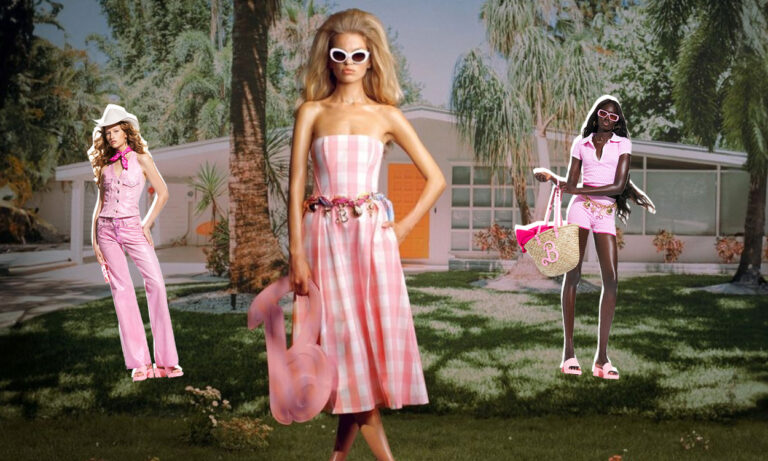Barbie wouldn’t have been a fan of the latest Zara collab, and neither should you
The day is finally here, it’s the eve of the Barbie movie release date—and yes, I’m more excited than I ever was on Christmas eve. While I already have my cinema ticket in hand and popcorn at the ready, the influx of Barbie-related fashion collaborations has raised some issues I feel must be addressed. I’m sorry to say that in the real world, life in plastic might not be so fantastic.
Though the Barbie promo tour has been seemingly never-ending, seeing the latest of Margot Robbie’s Barbie doll recreation outfits kept us all enthralled and completely obsessed. Then came the promo collabs. Our FYPs were filled to the brim with videos of the Barbie Malibu Dreamhouse Airbnb and info junkets about the Barbie menstrual cup—they just never stopped coming.
@elitedaily Life in plastic, it’s fantastic! Step inside the viral @barbie Dream House on @airbnb (hosted by Ken 💁♀️) with us ✨ #barbie #barbiedreamhouse #malibu #malibubarbie
♬ original sound - Barbie Movie
The latest in a heavy stream of Barbie collabs is the Barbie x Zara capsule collection. While the majority of other collabs focussed heavily on logomania, the fast fashion giant took a slightly different approach, one that aims to allow customers to dress up like Robbie rather than looking like the iconic doll’s biggest fan. Although, rest assured, we’re definitely both. Zara even thought of creating garmz for Ken’s minions, too.
My personal favourites from the collection are the metallic halter neck co-ord, the pink gingham dress and the raffia beach bag. I will stop at nothing to pull together the perfect fit for my trip to the cinema and the impending Barbiecore summer. Fast fashion and its long list of problematic aspects, however, might be the thing to hold me back.
We’ve all been there before: you see a Zara item go viral on TikTok, but as soon as you find time to pop into one of its many stores, it’s already disappeared from the shelfs. That’s because Zara is essentially glorified fast fashion. It’s got the fancy logo and editorial campaigns, but it equally employs mass production manufacturing.
Zara is owned by Inditex, aka the largest global fast fashion conglomerate out there. In 2021, the company had a whopping 565,027 tonnes of garments on the market, and the recent Barbie collabs are only making it worse. Such a massive collection turnaround means that there is a landfill somewhere out there just waiting for Barbiecore to be another throw-away micro-trend.
@alltheperks Replying to @ericakekenealon it’s as fast as they get #overconsumption #microtrends
♬ original sound - djparry
Forever 21 and Gap have also jumped on the Barbie hype train with their respective one-off collections. The Forever 21 collection undeniably fits the brand’s stereotype (think teeneybopper mesh T-shirts with the Barbie logo blazed across your chest). The Gap collection, on the other hand, is more grown up. Gap’s T-shirts feature a hybrid of the Gap and Barbie logo in bright pink—it would be rude not to.
The problem with such one-off collections is that they encourage impulse buying. Even I’m guilty of buying something I don’t need or even want in the long run, simply because I feel threatened by the thought of it selling out or because I can’t fight off that gut-wrenching feeling of wanting something you can’t have. Companies like Zara are not only playing with our money, but our feelings, too.
Limited edition collections also promote haul culture. Over the COVID-19 pandemic lockdown, TikTokers bought in bulk, leading fast fashion giants to mass produce and the increasingly rapid production of micro-trends. Julia Peterson, senior insights strategist specialising in youth culture, told Vogue Business: “Despite [gen Zer’s] desire to shop responsibly, I think there’s also this other side of them that is craving style, craving products that are going to make them feel good and that are affordable.”
So when it comes down to it, as much as I’m gagging to get my pink clobber on and head to the movies, there is no doubt that the never-ending Barbie collabs helped perpetuate throwaway fashion. Whether it’s limited edition beauty launches or Zara’s mass-produced clothes collection, that’s a whole lot of plastic that will end up in landfill as opposed to the Barbie Malibu Dreamhouse. This Barbie is turning her back on fast fashion.





